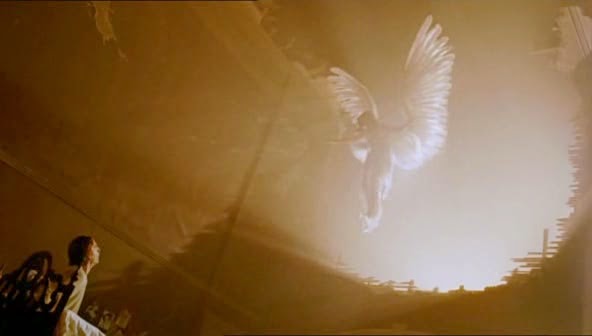 |
| Left to right: Leslie Caron and Mike Nichols |
There's a lot that can be said about director Mike Nichols' influence on cinema. For starters, his films combined racked up a total of 42 nominations and 7 total wins. Beyond the numbers, his influence is still felt today in a lot of his films, notably The Graduate, which he won Best Director for. That film is important for a lot of reasons, including the Simon & Grafunkel soundtrack which when set to footage of a brooding Dustin Hoffman created the most iconic symbolism of 60's wayward youth. It also helps that the film itself featured bold, risque subject matter that paved the way for 70's New Hollywood movement and redefined the movie soundtrack simultaneously. Even if this is all that he is known for, he would have left an important stamp on film history. However, he was so much more. He was an auteur.
For starters, Nichols wasn't just a film director. He was a comedian and man of theater as well. While his film directing has been sparse since 2007's Charlie Wilson's War, he has directed "Death of a Salesman" productions on stage, which he received a Tony Award for. Starting off in comedy with Elaine May as the duo Nichols and May, they released four albums together. One of their shows even went to Broadway ("An Evening with Mike Nichols and Elaine May"), which resulted in a Grammy win. It was the basis for a promising career and one that would slowly see him evolve from the comedian to his own direction on stage.
This is likely why he was able to get actors to turn in top notch roles. He began his directorial career with Who's Afraid of Virginia Woolf?, which paired Elizabeth Taylor and Richard Burton into a darkly intense drama that was strengthened by the fact that the two were a real life couple. It was a performance showcase of a failing marriage that lead to his most successful film (by The Academy's standards) with 13 nominations and 6 wins. The film currently sits on American Film Institute's Top 100 Films along with The Graduate, the latter of which was in the Top 10 in 1998. Still, between the two films, his ferocious energy and choice to question norms set out for a career that would only continue to grow more interesting as time went on.
His continuing career also featured some fascinating films that defied the standards, including Catch-22, which featured a famous monologue by the rarely drunk Bob Newhart. There was Silkwood, which pitted Cher and Meryl Streep in a film that explored environmental issues as well as sexuality in Cher's character. This was the start of a more active and compelling Nichols. While he continued to shift between stage work and film (he did make the enjoyable Gilda Live! starring Gilda Radner), he made the movies count by turning in a series of great performances. He was even crucial in making one of cinema's most successful gay films with 1996's The Birdcage, which saw a usually flamboyant Robin Williams play a more nuanced "straight" man to the typical gay Nathan Lane. It was in a time when AIDS was still a rampant subject and the tolerance was still building.
While there are likely to be several films that will be spoken about in the wake of Nichol's death, there was one that has sadly been ignored that I feel encapsulates everything about him perfectly. From his social activism to his theater history to his desire for a more open conversation about gay rights, there is one thing that he directed that deserves more recognition: Angels in America. While not technically a film in the traditional sense, it was a four hour miniseries on HBO that combined a phenomenal cast that included Al Pacino, Meryl Streep, Patrick Wilson and Justin Kirk (to name a few) as they ventured through New York as they each dealt with different issues relating to gays. The stage show was written by Tony Kushner and was a hit on Broadway. More than anything else he has done, he managed to create something relevant and powerful that swept the Golden Globes with 5 wins. It is a powerful film full of a rich, complex history in early 90's America.
To summarize his works in one piece is a little hard. If nothing else, he holds a distinct honor of being an EGOT, or person who has won an Emmy, Grammy, Oscar and Tony. He was a true artist who always challenged himself to entertain. Most of all, he managed to pull out the best performances from his actors and even added a layer of social commentary that gave a timeless feel to his films. While he'll always be known for The Graduate or The Birdcage, he has done so much more that will hopefully be explored and respected more as his legacy ages. Even his final film, Charlie Wilson's War, features some of veteran actors Tom Hanks, Philip Seymour Hoffman and Amy Adams' best (thanks in part to Aaron Sorkin's script). No matter how far his expansive career spanning over half of a century reached, he leaves behind a positive change to our culture, which makes his death all the more sad. Take some time out of your busy day to watch one of his many films and realize just how much he did to improve our film conversation.

No comments:
Post a Comment